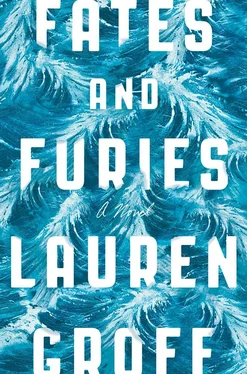It was less, she thought, like looking at a corpse than like looking at the place where a corpse had been buried.
Her heart cracked open and leaked. This one had been for her.
She sent Klaus a car much nicer than her own. His voice was amused this time when she called him. “The work is done,” he said, “but not without much screaming and much, much rage. Many tears. I am afraid you cannot show your face in that town at any time soon.”
“Ah, well,” she said. “What else is new.”
She said it lightly, yes. Still, she felt the old beast stirring in her.
“YOU’RE A PATHOLOGICAL TRUTH-TELLER,” Lotto once said to her, and she laughed and conceded that she was. She wasn’t sure just then if she was telling the truth or if she was lying.
Great swaths of her life were white space to her husband. What she did not tell him balanced neatly with what she did. Still, there are untruths made of words and untruths made of silences, and Mathilde had only ever lied to Lotto in what she never said.
She didn’t tell him that she never minded being the breadwinner during the long span of their twenties, even the poverty, even the skipped lunches and the suppers of rice and beans, even the shifting of money from one tiny account to pay off the most pressing bills, even accepting money from Lotto’s little sister, who gave it because she was one of the few people in the world who were truly good. His gratitude for what he thought was Mathilde’s sacrifice indebted him to her.
She did mind something she never said aloud: she’d wished her husband were better at what he chose to do.
All of that standing in line in the rain. Going in only to perform a monologue. Home again to wait by the phone that rang with no job. Sulking, drinking, throwing parties. Growing fat, losing his hair, losing his charm. Year after year after year.
The very last winter in the underground apartment, she painted the ceiling gold to simulate sunshine, to cheer herself up, to give herself courage to sit Lotto down and tell him, gently, the truth: that though she believed in him, he might want to find a career he believed in as well. This acting pursuit was not going to work out.
Before she could gather the courage, New Year’s Eve came around. He got drunk as usual, but instead of drifting to sleep, he stayed up and at a white heat wrote what had been sitting on his heart for decades. When she woke in the very early morning, she saw the computer and thought, first, of her jealousy, so assiduously suppressed, of him chatting on Instant Messenger with some pretty, blond avatar of a sad sixteen-year-old outcast. She picked the laptop up to read what he’d written. And she saw with wonder that it was a play and that it had the bones of a marvel in it.
She took it into the closet in the bedroom and worked feverishly. She edited, condensed, cleaned up the dialogue, and reshaped the scenes. He didn’t remember what he’d written when he woke. She easily passed it off as entirely his.
In a few months, The Springs was finished. Polished. Mathilde read it over and over at night in the closet while Lotto slept, and knew it was good.
But though it was a wonderful play, a play that would later change their lives, nobody wanted to read it. Lotto took it around to producers, theater directors. They took the copies he’d had bound, and nobody returned his call. And Mathilde watched her husband’s reborn twinkle dwindle again. It felt like a slow death of debridement, tiny constant bleeds.
An idea came in the form of one of Antoinette’s notes, a short article ripped out of a magazine on Han van Meegeren, the art forger who had convinced the world his own wan paintings were Vermeers, though every Jesus he painted had the forger’s own face. Antoinette had circled an X-ray of a fake, where, through the ghostly round face of a girl, you could see the uninspired seventeenth-century canvas Meegeren painted on: a farmyard scene, ducks, watering cans. Fake layer atop bad base. Reminds me of someone, Antoinette wrote.
Mathilde went to the library one weekend when Lotto was up in the Adirondacks camping with Samuel and Chollie, a vacation that she had planned, to get him out of the way. She found the plate she wanted in a heavy book. Gorgeous white horse carrying a blue-robed man in the foreground, a confusion of heads on other horses, a stunning building on a hill against the sky. Jan van Eyck, she’d discovered many years ago, in college. When she saw the slide during the class, her heart had gone still.
And to think she had held it in her hands in the tiny room under the stairway in her uncle’s house. She had smelled it: old wood, linseed oil, time.
“Stolen in 1934,” the professor had said. “One panel of a larger altarpiece. It is assumed that it was destroyed many years ago.” He clicked to the next example of disappeared art, but she could see nothing but brilliant fuzz.
At the library, she paid for a color photocopy and typed up a letter. No salutation. Mon oncle, it began.
She sent both letter and photocopy in the mail.
A week later, she was cooking spaghetti, blending up pesto, and Lotto was on the couch, staring at a copy of A Lover’s Discourse , his eyes unfocused, breathing through his mouth.
He answered the telephone when it rang. He listened. “Oh my gracious,” he said, standing. “Yes, sir. Yes, sir. Yes, sir. Of course. I couldn’t be happier. Tomorrow at nine it is. Oh, thank you. Thank you.”
She turned, a spoon steaming in her hand. “What was that?” she said.
He was pale, rubbing his head. “I don’t even,” he said. He sat heavily.
She came over and put herself between his legs, touching his shoulder. “Baby?” she said. “Is something wrong?”
“That was Playwrights Horizons. They’re putting on The Springs. A private financier went crazy for it and is funding the whole thing.”
He put his forehead on her chest and burst into tears. She kissed him on the cowlick at the back of his head to hide her expression, which she knew would be ferocious, grim.
—
WHEN, A FEW YEARS LATER, an attorney contacted her on her phone at the theater where Lotto was helping to cast his new play, she listened intently. Her uncle, the attorney said, had died [carjacking; crowbar]. He’d left his money to a home for indigent mothers. There was, however, a collection of antique Japanese erotica he’d left to her, Aurélie. She said, “But I’m not the person you’re looking for. My name is Mathilde,” and hung up. When the books were delivered to the apartment anyway, she took them to the Strand, and with what she earned, she bought Lotto a watch that would stay watertight to four hundred feet deep.
—
ON THE OPENING NIGHT of The Springs , Mathilde stood with Lotto in the dark.
Broadway! To begin so grandly! He’d been dazzled by the luck; she smiled, knowing that luck was not real.
The workshops had gone brilliantly; they’d attracted a Tony winner for the role of Miriam: undulant, lazy, simmering, the mother. The actors playing Manfred and Hans, the father and son, were barely known now but would be, a decade later, marquee names in feature films.
There was a smattering of strangers, some intrepid avant-gardists. But, confronted by the director in a whispered tête-à-tête with the dismal advance sales the afternoon before, Mathilde had spent all morning and afternoon on the telephone, and had filled the empty seats with their friends. The audience was boisterous, and the mood of the theater giddy and friendly before the houselights dimmed. Only Lotto could draw three hundred loyalists at the last minute out of goodwill alone. He was beloved, uniquely, deeply.
Now, in the dark, she watched the subtle transformation as her husband lost himself. So anxious these past months he’d become again the thin, too-tall boy she’d married. The curtain parted. And she watched with amusement at first and then with a warmth that bordered on awe as he mouthed the lines, made faces for each character as the actors came on and off. It became a sort of one-man show in the shadows.
Читать дальше












